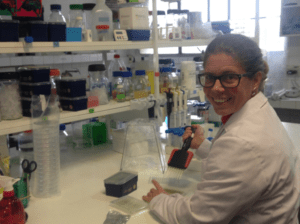Our November Immunologist of the month is María Moreno, an Assistant Professor at Universidad de la República, Montevideo-Uruguay.
Mariana Rivera, an Immunopaedia Ambassador, conducted a written interview of Ass. Prof. Moreno focusing on immunotherapies for cancer, and the research she conducts in this field.
Name: María Moreno
Position: Assistant Professor at the Department of Biotechnology, Institute of Hygiene, Medical School, Universidad de la República, Montevideo-Uruguay
Research Interests: Immunotherapies.
More in depth details about their research field in general: Development of new immunotherapies based on the use of attenuated Salmonella to treat cancer.
How has your research impacted the field of immunology? In many cancers, the ability of the immune system to eliminate transformed cells is generally impaired by intrinsic mechanisms of downregulation that lead to immunosuppression. The use of immunotherapies would help to reverse this situation. Indeed, many of the recently Food and Drug Administration (US)-approved cancer therapies are aimed at overcoming immunosuppression, such is the case of monoclonal antibodies against immune checkpoints and CAR-T cells. However, despite their great potential, the highly elevated costs of these treatments and/or the complex logistics limit their worldwide application.
Over the last years we have demonstrated the potential of a bacteria, namely Salmonella sp., as immunotherapy for the treatment of lymphoma and melanoma. Salmonella has shown great potential as cancer immunotherapy thanks to its capacity to accumulate in tumors, intrinsic anti-tumor activity and ability to trigger an immune response in the tumor microenvironment. This alternative therapy has the advantages of being inexpensive, having a safe profile and being universal. Therefore, we believe that Salmonella could be an effective therapy against several cancers, and we currently focus on accumulating enough evidence to transferred Salmonella into clinical trials.
Which one of your authored or co-authored articles is your favourite and why? Bascuas T, Moreno M, Grille S, Chabalgoity JA. 2018. Salmonella immunotherapy improves the outcome of CHOP chemotherapy in Non-Hodgkin Lymphoma-bearing mice. Frontiers in Immunology.
This work demonstrates the potential of Salmonella in combination with chemotherapy for the treatment of non-Hodgkin lymphoma. It highlights the benefit of Salmonella administration in animals undergoing chemotherapy, first line treatment for lymphoma. Salmonella immunotherapy not only improves the outcome of chemotherapy, but also improves the general health status of lymphoma-bearing mice.
If you weren’t an immunologist, what would you be? Chef, the kitchen is a challenging but rewarding lab.
What do you think is essential to succeed as an immunologist or scientist? To be determined
What is your advice to those who are starting their career in research/immunology? Find an eager mentor.
Interview by Mariana Rivera
